
The Montgomery bus boycott was a political and social protest campaign against the policy of racial segregation on the public transit system of Montgomery, Alabama. It was a foundational event in the civil rights movement in the United States. The campaign lasted from December 5, 1955—the Monday after Rosa Parks, an African-American woman, was arrested for her refusal to surrender her seat to a white person—to December 20, 1956, when the federal ruling Browder v. Gayle took effect, and led to a United States Supreme Court decision that declared the Alabama and Montgomery laws that segregated buses were unconstitutional.

The Congress of Racial Equality (CORE) is an African-American civil rights organization in the United States that played a pivotal role for African Americans in the civil rights movement. Founded in 1942, its stated mission is "to bring about equality for all people regardless of race, creed, sex, age, disability, sexual orientation, religion or ethnic background."
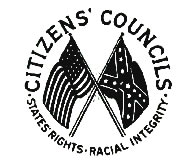
The Citizens' Councils were an associated network of white supremacist, segregationist organizations in the United States, concentrated in the South and created as part of a white backlash against the US Supreme Court's landmark Brown v. Board of Education ruling. The first was formed on July 11, 1954. The name was changed to the Citizens' Councils of America in 1956. With about 60,000 members across the Southern United States, the groups were founded primarily to oppose racial integration of public schools: the logical conclusion of the Brown v. Board of Education ruling.

The Montgomery Academy is a non-sectarian independent day school located in Montgomery, Alabama. The Lower School accommodates kindergarten through fourth grade and the Upper School fifth through twelfth. The school's current total enrollment is just under 900, of which approximately 300 are in the Upper School. Montgomery Academy was founded in 1959 as a segregation academy.

Segregation academies are private schools in the Southern United States that were founded in the mid-20th century by white parents to avoid having their children attend desegregated public schools. They were founded between 1954, when the U.S. Supreme Court ruled that segregated public schools were unconstitutional, and 1976, when the court ruled similarly about private schools.

Elonnie J. Josey was an African-American activist and librarian. Josey was the first chair of the Black Caucus of the American Library Association, having been instrumental in its formation in 1970; served as president of the American Library Association from 1984 to 1985; and was the author of over 400 books and other publications.

Johnnie Rebecca Daniels Carr was a leader in the Civil Rights Movement in the United States from 1955 until her death.
The Jim Crow laws were state and local laws introduced in the Southern United States in the late 19th and early 20th centuries that enforced racial segregation, "Jim Crow" being a pejorative term for an African American. Such laws remained in force until 1965. Formal and informal segregation policies were present in other areas of the United States as well, even as several states outside the South had banned discrimination in public accommodations and voting. Southern laws were enacted by white-dominated state legislatures to disenfranchise and remove political and economic gains made by African Americans during the Reconstruction era. Such continuing racial segregation was also supported by the successful Lily-white movement.
Demetrius Caiphus Newton was an American civil rights attorney and politician. He filed lawsuits to end segregation, and represented Martin Luther King Jr., Rosa Parks, and others in cases related to civil rights. He then served in the Alabama House of Representatives, representing the 53rd district, from 1986 to his death in 2013. He became the first Black speaker pro tempore in the history of the Alabama House, serving in the role from 1998 through 2010.

Patricia Swift Blalock was an American librarian, social worker, and civil rights activist born in Gadsden, Alabama.
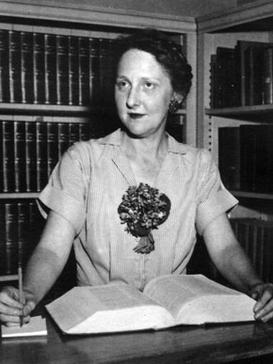
Juliette Hampton Morgan was a librarian and civil rights activist in Montgomery, Alabama. The only daughter from a well-to-do white family, Morgan was an early member of the community that pushed for integration. As a librarian she often spoke out against the acts of injustice she witnessed against African-Americans by writing letters to the Montgomery Advertiser, the local newspaper. She was castigated by the community for her racial views and was targeted by segregationists who broke her windows and burned a cross in her front yard. Unable to bear the strain caused by the unrelenting retaliation caused by her views, she took her own life.
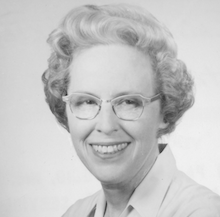
Emily Wheelock Reed was a librarian in Alabama who served as director of the Alabama Public Library Service Division during the civil rights movement. She stood up to segregationists seeking to remove books such as the 1958 Garth Williams children's book, The Rabbits' Wedding, from state libraries.
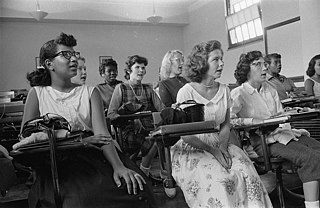
In the United States, school integration is the process of ending race-based segregation within American public and private schools. Racial segregation in schools existed throughout most of American history and remains an issue in contemporary education. During the Civil Rights Movement school integration became a priority, but since then de facto segregation has again become prevalent.
This is a timeline of the civil rights movement in the United States, a nonviolent mid-20th century freedom movement to gain legal equality and the enforcement of constitutional rights for people of color. The goals of the movement included securing equal protection under the law, ending legally institutionalized racial discrimination, and gaining equal access to public facilities, education reform, fair housing, and the ability to vote.

The Mississippi Library Association (MLA) is a professional organization for Mississippi's librarians and library workers. It is headquartered in Jackson, Mississippi in the Mississippi Library Commission building. It was founded October 29, 1909 by Whitman Davis, a librarian at Mississippi A & M College. In 1968, it became incorporated as Mississippi Library Association, Inc.

The Louisiana Library Association (LLA) is a professional organization for Louisiana's librarians and library workers. It is headquartered in Baton Rouge, Louisiana. The LLA publishes The LLA Bulletin (est. 1937) and Louisiana Libraries magazine.
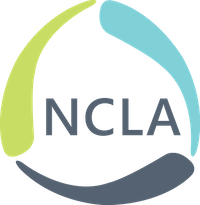
The North Carolina Library Association (NCLA) is a professional organization for North Carolina's librarians and library workers. It is headquartered in High Point, North Carolina. It was founded on May 14, 1904, in Greensboro, North Carolina. The original organization had thirty-two charter members and Mrs. Annie Smith Ross from the Carnegie Library in Charlotte was the association's first president.
The North Carolina Negro Library Association (NCNLA) was a professional organization for North Carolina's black librarians and library workers. It was the first black library association in the United States and the first black chapter in the American Library Association. It was headquartered in Durham, North Carolina at the North Carolina College for Negroes beginning in 1942.

The Georgia Library Association (GLA) is a professional organization in the United States for Georgia's librarians and library workers. It is headquartered in Savannah, Georgia. It was founded as The Georgia Library Club by members of the Young Men's Library of Atlanta and Georgia Federation of Women's Clubs. The organization changed its name to the Georgia Library Association at its first business meeting. GLAs first president was Anne Wallace, elected at the organization's first meeting May 31, 1897, in Atlanta, Georgia.
Carrie Coleman Robinson was an African American educator and librarian. Robinson was a founding trustee of the Freedom to Read Foundation and a founder of the Alabama Association of School Librarians.
















